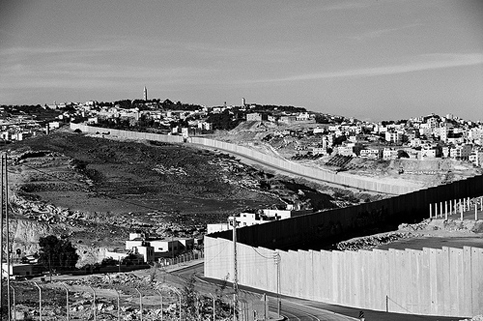Behind the Boycott
- by Vivian Tabar. The Dominion

- Photo: Israel’s Apartheid Wall.
MONTREAL–Demonstrators converged outside of Indigo bookstore in the heart of downtown Montreal last Saturday to commemorate the 25th anniversary of the 1982 massacre of Sabra and Chatila that claimed the lives of thousands of Palestinian refugees in Lebanon. Waving banners that read “Boycott Israeli Apartheid, Boycott Indigo”, picketers called on the largest bookstore chain in Canada to cut its ties to Israeli Apartheid.
“Our main demand is for Heather Reisman and Gary Schwartz is to withdraw their support for the HESEG foundation,” explains Ehab Lotayef, member of the Coalition for Justice and Peace in Palestine (CJPP) on Montreal’s busiest downtown street. “HESEG foundation is immoral from our point of view, as HESEG directly supports a foreign army with a disastrous record on human rights.”
The majority owners of Chapters Indigo, Heather Reisman and Gary Schwartz founded the ‘HESEG Foundation for Lone Soldiers’ in 2005. The HESEG foundation provides financial support to ‘Lone Soldiers’, a lone soldier being a person who lives outside of Israel, and has no family in Israel, but chooses to serve in the Israeli Army.
Following service in the Israeli army, the HESEG foundation awards successful applicants with university scholarships and living expenses as rewards for serving in the military.
According to the Coalition Against Israeli Apartheid (CAIA), HESEG will provide “up to $3 million worth of scholarships and financial support”, with the number of lone soldiers ranging anywhere “between 5000-6000” from countries all around the world.
Lone soldiers serve in military combat throughout the West Bank and Gaza Strip.
On HESEG’s website, a film “presents the lives of lone soldiers.” The film is laced with ‘raw’ footage of soldiers training, tanks rolling, and advanced air and naval military machinery. In the film, “lone soldiers’ are interviewed about their combat experience, speak proudly of serving in the Israeli military.
A lone solider from Casablanca tell the camera “the army meant one thing: combat.” The film also introduces a soldier from the United States who served in the Golani Brigades, a ground unit which fought in Lebanon last summer and serves in Jenin. He says he “wanted some action” and the “Golani promised I would see some”.
International human rights organizations, including Amnesty International, have charged the Israeli military with committing “war crimes” both in the occupied territories and in Lebanon. According to the Israeli human rights organization B’Tselem, in 2006 alone, the Israeli army “killed 660 Palestinians, including 141 minors.”
The Israeli military also is the armed enforcer of a complex matrix of checkpoints, settlements, by-pass roads, and the wall, which cements Palestinians into ghettoized areas, which demonstrators compare to South Africa’s bantustans. It is Israel’s policy of physical separation through military power, demonstrators say, that has ignited international campaigns against “Israeli Apartheid”, including the campaign in Montreal.
Reisman and Schwartz of Chapters Indigo aren’t ambivalent about their connection to the Israeli military. Since the creation of HESEG, in 2006, the Jerusalem Post reported that Reisman was publicly awarded an Israeli firearm to mark the death of a ‘lone soldier’ who fought in 2006 Lebanon war.
“If Indigo stands in support of occupation, apartheid, and the genocidal policies of Israeli, than we must boycott them,” said Patrick Cadorette of Block the Empire, an anti-imperialist collective in Montreal, at the picket outside of Indigo bookstore.
The September 22nd picket in Montreal was part of a national “Boycott, Divestment, and Sanctions” (BDS) campaign in Canada “against Israeli Apartheid” launched in response to a call made by over 170 Palestinian civil society organizations to boycott and divest from Israel in 2005.
The 2005 appeal calls on activists internationally to support a boycott campaign against Israel, “until it ends its occupation and dismantles the wall, grants Palestinian citizens of Israel full equalities, and allows for the over 4 million Palestinian refugees to return to their homes, in keeping with Israel’s obligations under international law and UN resolution 194.”
The boycott of Chapters Indigo and its other outlets–The World’s Biggest Bookstore, Smith Books, Cole’s, The Book Company and Indigo Spirit–are happening all across Canada, including actions in Toronto, Montreal, Vancouver, and Victoria. Since December 2006, members of CAIA in Toronto and Montreal have been conducting bi-weekly pickets in front of Chapters Indigo stores.
Palestinian solidarity activists have also publicly confronted Heather Reisman on her role in the HESEG foundation and support for Israeli ‘Lone Soldiers’.
On Tuesday, September 18th, a group of activists from Montreal, publicly confronted Reisman, at a book launch for the former Conservative Canadian Prime Minister, Brian Mulroney at Indigo. At the event, demonstrators unfurled banners and publicly posed questions on the HESEG foundation to Reisman, disrupting the Mulroney book launch.
In June, the Coalition Against Israeli Apartheid in Toronto interrupted Reisman at a public book launch with Ralph Nader, by asking her about her support for Israeli “lone soldiers.”
The recent Montreal picket was held on the 25th anniversary of the Sabra and Chatilla massacres in 1982. In the context of the 1982 Israeli occupation of Beirut, the Israeli military, under the command of Ariel Sharon, allowed right-wing Lebanese Phalangists militias to enter refugee camps, where they carried out the 48 hour massacre on unarmed Palestinian refugees. The number killed is generally agreed to be near 2,000, but a study by Israeli journalist Amnon Kapeliouk estimated as many as 3,500 killed.
“Sabra and Chatila massacre is one of the most tragic events in Palestinian history,” Lotayef explains. “Although the Israel army continues to claim they don’t have direct blood on their hands, Israel [was obligated] under international law to prevent the massacre from happening as they were occupying Beirut,” Lotayef adds. “Israeli military forces provided the logistics for the massacre to happen,” says Lotayef outside of the Indigo bookstore in downtown Montreal.


